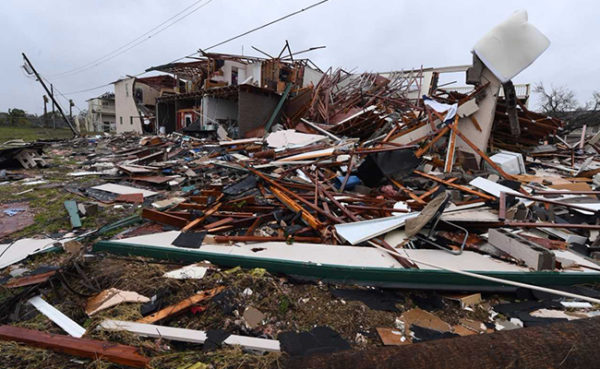Does God Punish People Through Natural Weather Events?
by Dr. Randal Rauser
Filed under God, The Problem of Evil

So God said to Noah, “I am going to put an end to all people, for the earth is filled with violence because of them. I am surely going to destroy both them and the earth. […] I am going to bring floodwaters on the earth to destroy all life under the heavens, every creature that has the breath of life in it. Everything on earth will perish." - Genesis 6:13, 17
“This flood is from God. It’s a judgment on America.” - Jim Bakker
Harvey. Irma. Katia. Jose. This is turning out to be an active hurricane season. And predictably it gives rise to those would-be prophets like Jim Bakker who boldly proclaim that these severe weather events should be interpreted as God’s judgment.
One may question such pronouncements both for their pastoral wisdom and accuracy. But they do force us to ask: how do we know Bakker is wrong?
After all, the Bible regularly describes God as rendering judgment with the hammer of severe weather events: storms, floods, and droughts are all described in punitive terms. And with no clear Biblical evidence that God has declared a moratorium on the practice, the question inevitably presents itself: does God punish people through the weather in our day? In short, while Jim Bakker may be wrong, could he possibly be right?
In this article I will briefly outline three considerations that support the conclusion that God would not punish people by way of severe weather events and thus that Bakker could not be right.
Definitions
First, let’s begin with definitions for three key terms: God, severe weather events, and punishment.
When I refer to “God” I mean a being who is omnipotent, omniscient, and perfectly good.
When I refer to “severe weather events” I am thinking not of limited events that have discrete effects like a single lightning bolt striking a particular individual. Instead, I am thinking of complex and expansive systems and processes that affect potentially hundreds, thousands, or even millions of human beings and other sentient creatures: for example, a devastating flood or a scorching heat wave.
Finally, when I refer to “punishment” I mean the act of imparting a penalty to an individual for an offense committed.
Thus, my core claim is that God would not inflict punishment by way of severe weather events. To support this claim I will identify three characteristics of severe weather events which make them unbefitting as modes of punishment.
Discriminate Punishment
To begin with, God would employ modes of punishment that discriminate the guilty from the innocent while restricting punishment to the former. Furthermore, God would employ modes of punishment that adjust the intensity of punishment relative to the culpability of the individuals being punished.
By contrast, severe weather events are indiscriminate in their effects. In other words, the very complex and random nature of these events is such that they do not distinguish the culpable from the innocent or the more culpable from the less culpable. Instead, they destroy homes, wreak carnage, and inflict injuries and grave emotional suffering seemingly at random.
Consider the recent flooding that resulted from Hurricane Harvey. That flooding did not discriminate the morally wicked. Nor was the experience of flooding proportional to the guilt of individuals who suffered.
For example, one of the first and most horrifying tragedies resulting from the flood occurred when four children and their great-grandparents drowned after their van plunged into a raging torrent while trying to escape the flood. At the same time, the children’s great uncle escaped the van. Should we conclude that the children (including a six year old) and their great-grandparents were justly drowned as punishment for some actions while the great uncle was properly spared?
To be sure, it is logically possible that God could employ a severe weather event which discriminates in the way we expect of proper punishment. For example, picture a severe thunderstorm which pelts only the guilty with hail and which hits those who are most guilty with the largest hail pellets.
While this is a logical possibility, it is not how (punitive) severe weather events are described in the Bible. Nor is it how severe weather events seem to occur today.
Unambiguous Punishment
Second, God would employ modes of punishment that unambiguously link the punishment to the offense. Doing so is important for deterrence, reformation, and punition.
Imagine, for example, that Billy steals a cookie from the cookie jar. His parents observe his deceptive action but they say nothing. Then, six months later, Billy’s parents suddenly inform him that he cannot watch any television or play video games for the day. Billy’s parents intend this prohibition as punishment for Billy’s deception six months earlier, but they never tell him their actions are punishment for his deception.
This seems quite improper. It would be wrong for Billy’s parents to punish him without explaining what the punishment was for. Proper punishment requires the one being punished understand the link between his/her indiscretion and the resulting punishment.
Needless to say, natural disasters like hurricanes and floods lack the interpretive context necessary for proper punishment. Apart from the occasional alleged prophet who typically addresses a relatively small subset of the affected population, there is no clear link between a specific severe weather event and some particular indiscretion.
Proportional Punishment
Finally, punishment ought to be proportional to the offense and thus should not be cruel and unusual.
By contrast, if the suffering that is produced by natural disasters were classified as punishment, much of it would surely be categorized as cruel and unusual. Consider the recent flooding in Houston as a result of Hurricane Harvey as an example. From elderly people in a retirement home slumped over in their wheelchairs, waist-deep in fetid, sewage-laced water to terrified children being pulled to their watery grave in a raging current, the suffering produced by the floods in Texas is anything but a proportional response to an offense.
To drive the point home, we should reflect in particular on the horror of drowning. A decade ago at the height of the controversy over water-boarding as a means of interrogation, Christopher Hitchens submitted himself to be water-boarded — a process that simulates drowning — to see if it really qualifies as cruel and unusual punishment. The memorable title of the article he wrote of his experience was titled “Believe Me, It’s Torture.” It is worth quoting his account at some length:
“In this pregnant darkness, head downward, I waited for a while until I abruptly felt a slow cascade of water going up my nose. Determined to resist if only for the honor of my navy ancestors who had so often been in peril on the sea, I held my breath for a while and then had to exhale and—as you might expect—inhale in turn. The inhalation brought the damp cloths tight against my nostrils, as if a huge, wet paw had been suddenly and annihilatingly clamped over my face. Unable to determine whether I was breathing in or out, and flooded more with sheer panic than with mere water, I triggered the pre-arranged signal and felt the unbelievable relief of being pulled upright and having the soaking and stifling layers pulled off me. I find I don’t want to tell you how little time I lasted.”
Now, if you dare, try to imagine the experience of four small children and their great-grandparents being pulled under those swift-moving floodwaters. Is there any condition under which such deaths could be considered just punishment?
Conclusion
If I am correct that God would only exercise punishment that is discriminate, unambiguous, and proportional, and severe weather events have none of these properties, then it follows that God would not punish by way of severe weather events. From this it follows not only that Jim Bakker is probably wrong, but that he must be wrong.
While this is a reassuring conclusion, it does stand in tension with the straightforward Biblical accounts of God utilizing severe weather events for the purposes of punishment. So one must choose. Should one reject the three hallmarks of punishment listed in this article? Or should one find another way to read the Biblical texts in question?
Related Posts
Note: Our goal is to cultivate serious and respectful dialogue. While it's OK to disagree—even encouraged!—any snarky, offensive, or off-topic comments will be deleted. Before commenting please read the Commenting Rules and Tips. If you're having trouble commenting, read the Commenting Instructions.












